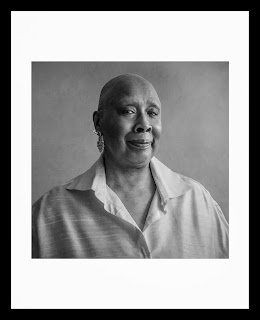 |
This weekend, Danspace Project presents shared evenings of work
by dance artists Jasmine Hearn (above) and Mariana Valencia (below).
(photos: Ian Douglas) |
Maybe this Earth is a bed where each of us rests on the threshold of a dream or all of us can dream collectively. Sitting down to take in this spell by
Jasmine Hearn (
shook at
Danspace Project) means drawing near a fire to hear old, passed-down stories, but the fire is invisible, the stories and songs muffled, the images shadowy, blurry. It might not matter if you can't pick up distinct words, follow sentences; if a song is made up of one word that trails off in the air or is simple sounds intoned in a flutey voice. It calls you to take part in the making.
The costumes are equally indistinct, cobbled together as if by a child who had leafed through pages of history, falling asleep atop them, dreaming and dreaming. The fabric--how unruly, voluminous, billowing, ennobling...or thrown together with function if not sense. The movements--how softly fluid, swirly, simple, repetitive, shifting, un-insistent, graceful, agile (Hearn,
Angie Pittman,
Dominica Greene...these three and also the traces of all who made this, continue to make this, one spectre floating into the other....) You see what you will see. You dream what you will dream, unfolding a chiffon dream engulfing altar steps like sea foam slipping over a shoreline.
"This is the answer to my 7 year old self who casted spells in her bathtub...spells that dripped honey, affirmation, and the belief that magic lives in the marrow of our bones."
"I am looking to evoke a realm, a place, a time, a memory when/where black women are not doubted." -- Jasmine Hearn
Concept and direction: Jasmine Hearn
Choreography and performance:
Maria Bauman,
Kayla Farrish,
Dominica Greene, Jasmine Hearn,
Catherine Kirk and Angie Pittman
Costumes made in collaboration with
Athena Kokoronis of
Domestic Performance Agency
Sound: Jasmine Hearn (includes a rework of Sylvan Esso's
Die Young)
Video:
Alisha B. Wormsley
Lighting:
Kathy Kaufmann
 |
Scene from shook
Angie Pittman (at left) and Dominica Greene (center)
with Hearn
(photo: Ian Douglas) |
 |
Mariana Valencia performs Yugoslavia
(photo: Ian Douglas) |
"What are we if we are together but not related?"
In her solo,
Yugoslavia,
Mariana Valencia asks this question, specifically referring to her relationship to her Polish stepfather (and, I guess, in a way, her Polish stepfather's relationship to her Guatemalan mom).
One word that recurs in the work is
blend. Spoken with Valencia's characteristic clarity and evenness, the word
blend has its own physical pose. She hits it, and you watch it...for a few seconds. You might not understand it, but you can see it and recognize it when it comes around again. You learn a piece of movement language by immersive process.
Yugoslavia finds Valencia blending a lengthy monologue into movement in a way that seals any divide between verbal language and dance. That seems to work, although at least one person I spoke with afterwards found the piece to be not very dance-y. To me, it was a poetic marathon, a work of impressive endurance and grace under the pressure to tell a story with a lot of unexpected and seemingly unrelated moving parts and somehow make them hold together. Or not. I think, mostly, not.
At least, not for me. For me, they stayed demarcated, and that seemed okay. Or more than okay. That seemed the right thing.
In Yugoslavia, I intersect the First World, the Second World, the countryside, the imaginary plane and vampires. Factual, humorous, and grave observations depict my herstorical frame,” writes Valencia. With Yugoslavia, “I’m in search of the spiritual, in observation of the physical, and in awe of the artificial.”
See, those commas and "ands" work well, and the way Valencia speaks shows you one thing after another. And that seems the right thing. More juxtaposition than blend.
Blend might be an aspiration. Or not.
Writing about her
inspiration for the piece, Valencia says, "visiting the Balkans (Serbia and Macedonia) has awakened my lineage through Slavic languages. I'll be tuning into identities that are landless, homeless, nameless, wandering, and exiled." In other words, not so blended.
Mention of the Balkans also brings me to that word derived from their situation--
Balkanization, fragmentation often with tense and hostile juxtaposition of the separate entities. And then there's the discomfort of a young girl, Valencia, trying to sing Leonard Cohen lyrics with her dad without revealing her pleasure in the racy verses. Blending by omission? There's a single painting--just one--by her dad on a tripod in all of St. Mark's roomy space. And something about vampires because, we're told, the word
vampire originates in the Serbian language. A lot of thingy things.
I watched Valencia take sheets of raspberry red construction paper and cut them into letters that she then arranged on the floor. I'm not particularly good with cutting paper with any degree of accuracy. But, apparently, she is. She went right to it, and the letters turned out well-shaped. They looked like themselves and like nothing else.
Choreography, script, costume, set and performance: Mariana Valencia
Original score: Mariana Valencia
Lighting design: Kathy Kaufmann
Shared Evening: Jasmine Hearn & Mariana Valencia continues tonight and tomorrow with performances at 8pm. No late seating. For information and tickets, click
here.
Danspace Project
St. Mark's Church-in-the-Bowery
131 East 10th Street (at Second Avenue), Manhattan
(
map/directions)
 Subscribe in a reader
Subscribe in a reader








































